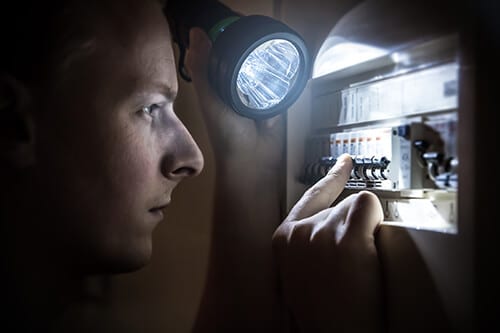How To Know If House Has Electrical Problems

Electricity is vital to our daily life. However, if you aren’t careful, it can be a potential source of destruction. It’s common for all homes to experience electrical problems at one point, even ones that are newly built. The wiring tucked behind closed walls is something that most people ignore. If you can spot electrical issues early in advance and make proactive repairs, it will help protect your family and assets from electrical fires.
While there are some issues that you can quickly fix, others require advanced safety, knowledge, and experience. You might need to call in an electrician to diagnose and resolve the problem in such a case. Pay attention to the following indications to determine faults in your electric connectivity before things get out of hand.
1. Flickering Lights
When your lights keep blinking for no apparent reason, chances are there is a power surge or loose connection. Power surges could be because your appliances demand more power than your system can supply. First, you need to find out how many bulbs are experiencing the problem to determine the source.
If the flickering occurs on just one light fixture, there could be a single wiring problem. This is straightforward to fix, and you can directly replace the lamp with a new one. If it affects several lamps, you have a circuit problem. However, if all light fixtures flicker in the house, the problem lies within the breaker box or service drop outside the home. Such a case requires professional attention.
Contact Brennan Electric today!
2. Hot Outlets and Switches
Although most electrical appliances generate heat while operating, the outlets or switches shouldn’t get hot. In the event that your light switches feel warmer or you see sparks on the outlet, unplug all the cords immediately. Don’t use the outlets until you determine the exact cause.
First, check for a loose connection. If you have a detached outlet, it passes higher electric power to meet the appliance’s demands. The excess energy then turns into waste, heating the outlet. Again, scorching marks or black spots around the outlets are a further indication of unsafe wiring. When neglected, this can quickly escalate to a fire. Overheating is a serious safety concern that requires immediate attention from a professional.
3. Burning Smell or Odd Odors
It’s common for new appliances to produce some unfamiliar odors upon installation. However, outlets, the electric panel, and the fuse box shouldn’t emit any smell. Using your nose, you can sniff out the source of an electric problem. A burning smell is an indication of fire damages that requires immediate attention. It means that your wiring is heating up to the point of melting its plastic cover. When left unattended, this could result in a hazardous fire outbreak. Unplug all equipment from the sockets, shut off the power, and call your electrician.
4. Electric Shock
An electric shock, however mild it might seem, is a clear indication of how dangerous electricity is when misused. If you place your hands on a metal surface connected to your electric system and feel some static shock, you either have a faulty appliance or bad wiring. You can unplug the device to determine the source, but you might risk another shock. Consider calling in an expert early enough to decide whether or not you have an improperly grounded electric system.
5. Spiking Electric Bills
If you suddenly get a higher electric bill than usual, look out for faulty wiring. Damaged cables cause energy leaks. They may also heat the appliances, causing them to consume more power. Additionally, old wiring that can’t handle modern appliances’ demands can lead to excessive energy consumption, drastically increasing electric use. To manage energy consumption, repair all the damaged wires, patch any leaks, and identify and fix equipment that could lead to power surges. Also, always unplug appliances and chargers when they’re not in use.
6. Frayed Wires
Over time, wires will crack and fray due to constant bending, corrosion, heat, or aging. They might also get punctured by nails or screws. Naked wires can potentially cause electric shock and fire outbreaks. Hence, have them replaced as soon as possible.
7. Aluminum Wiring
In the past, due to copper shortages, homebuilders used aluminum wires to keep costs lower. However, aluminum oxidizes quickly to build up heat, which can cause fire risks. Therefore, it’s very unsuitable for residential wiring.
If you live in an older house and suspect it has aluminum wiring, call an experienced electrician to discuss the available solutions. You can choose to rewire the entire property or add some specialized connectors to the existing wiring system.
8. Rodent Droppings Near Electrical Wiring
Rats and mites can also chew your electric wires and damage the cords. If you find rodent droppings in your basement or attic, check all the cables in those areas for any signs of damage. If you can’t spot any, contact a specialized contractor to further examine your wiring and fix all the damaged cords before they become hazardous.
9. Frequent Circuit Breaker Tripping
A circuit breaker trips when you connect multiple high wattage appliances to a single power source. In such a situation, flip back the circuit breaker and try using one appliance at a time or a couple at low settings. The problem can also be due to a malfunctioning outlet. If the issue persists, call a qualified electrician for a full system diagnosis. They may decide to add several power points to spread your electrical needs throughout the house, replace an old circuit breaker, or upgrade your wiring system.
10. Constant Buzzing Noises
All electrical outlets operate in silence when there’s a seamless connection. When you hear any humming or buzzing noises, first test the appliances to ascertain the cause. When the noises come from the walls, you could have frayed wires beneath. On the other hand, if it’s from the light switch or an outlet, currents could be skipping a gap across connections that aren’t in firm contact.
Turn off the power and contact an electrician immediately once you notice noises to run tests and determine the problem’s source. The solution can range from simple tasks like changing the outlet to more complex ones like rewiring the entire house.
Conclusion
Be on the lookout for the above signs of faulty electrical systems to address the issue before it escalates to major problems that could lead to expensive repairs. Sadly, most electrical faults occur due to wrong installations. Although you might feel tempted to try DIY installation projects, you could hurt yourself or cause a life-threatening danger at home.
Therefore, it’s best to leave such work in the hands of the professionals. Electrical systems are complex, but experts can accurately troubleshoot the problem’s source and develop the most comprehensive solution to fix it.
If you spot any of the above indications, seek professional help from Brennan Electric. We provide top-notch electrical services in Seattle and the surrounding Puget Sound area. You can reach out to us for home electrical inspections, complete panel surge protection, circuit upgrades, electric baseboards, and in-wall fan replacements services.
We also deal with light fixture installations, generator transfer switches, ground rods, surge protection and bonding services. Give us a call today to schedule an appointment, and we’ll take care of all of your electrical needs.

